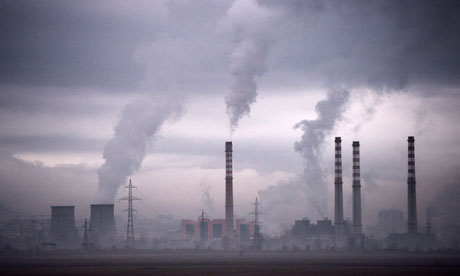What IPCC warns about are dire. It made the call for a stop to the 'dithering about fossil fuel cuts' saying that the "entire globe is affected," according to Robin McKie, science editor of The Observer's 21 September 2013 issue.
Photo credit: The Guardian
So far, this gloomy forecast is called the darkest of all due to the increasing hazards of global warming. The entire globe has now seen increased, intense warming from land surfaces, oceans and the atmosphere due to the burning of fossil fuels and deforestation.
The reasons for more catastrophic weather behavior including the melting of ice sheets at a faster pace has caused sea levels to rise and "oceans are being acidified – a development that could see the planet's coral reefs disappearing before the end of the century."
Climate change expert Lord Stern wrote in The Observer that there is a need to 'start working to create a global low-carbon economy to curtail global warming. Governments, he states, must decide what "kind of world we want to present to our children and grandchildren".'
Robin Mckie further says:
The fifth assessment report on the physical science of climate change by the Intergovernmental Panel on Climate Change (IPCC) warns that humanity is on course over the next few decades to raise global temperatures by more than 2C compared with pre-industrial levels. Such a rise could trigger the release of plumes of the greenhouse gas methane from the thawing Arctic tundra, while the polar ice caps, which reflect solar radiation back into space, could disappear.
Although the report does not say so, Earth would probably then be facing a runaway greenhouse effect.
The scientists' warning – the most comprehensive and convincing yet produced by climate scientists – comes at a time when growing numbers of people are doubting the reality of global warming. Last week, the UK Energy Research Centre (UKERC) published a survey showing that the proportion of British people who do not think the world's climate is changing has almost quadrupled since 2005.
Asked if they thought Earth's climate was changing, 5% of respondents said "no" in 2005, a figure that rose to 11% last year and reached 19% this year.
But as the IPCC report underlines, scientists are becoming more and more certain that climate change poses a real danger to the planet.
Many believe the disconnection between popular belief and scientific analysis has been engineered by "deniers" explicitly opposed to the lifestyle changes – including restrictions on fossil fuel burning – that might be introduced in the near future.
"There are attempts by some politicians and lobbyists to confuse and mislead the public about the scientific evidence that human activities are driving climate change and creating huge risks," said Stern.
"But the public should be wary of those who claim they know for certain that unmanaged climate change would not be dangerous. For they are not only denying 200 years of strong scientific evidence – the overwhelming view of the world's scientific academies and over 95% of scientific papers on the subject – but they are often harbouring vested interests or rigid ideologies as well."
The report will be discussed this week by political leaders meeting in Stockholm. The study – the work of more than 200 scientists – outlines the physical changes that are likely to affect Earth's climate this century.
Future reports will cover the social impact of these changes and the efforts required to offset the damage caused by global warming. A United Nations meeting in Paris in 2015 will then debate what actions are needed to mitigate climate change.
According to the new report, humanity has emitted about half a trillion tonnes of carbon by burning fossil fuels over the past 250 years, a process that has caused atmospheric carbon dioxide levels to rise by 40%. The world is now on target to release another half trillion tonnes in the next few decades which could trigger a major jump in global temperatures.
Most measures that have been proposed for tackling global warming rely on curtailing the burning of fossil fuels and these will form the focus of the 2015 UN meeting in Paris. Given the poor record of previous summits, many are pessimistic an agreement can be reached.
However, other measures have been suggested to curb global warming. In particular, many scientists have backed geo-engineering projects that would involve either spraying particles into the atmosphere to reflect solar radiation back into space or extracting carbon dioxide from the atmosphere in order to bury it in mines or depleted oil fields.
Both suggestions get short shrift in the new report: atmospheric aerosols could have widespread side-effects that could produce major disruptions to weather patterns, while not enough is known about the effectiveness of carbon dioxide extraction or burial. "We have to face up to the prospect of weaning ourselves off our addiction to oil and coal," said one report author. "It is as simple as that."
This site wholly agrees with the scientists' report on the forthcoming grave dangers of the burning of fossil fuel and deforestation.
To compound the situation however, it is predicted by the scientific community as well, that within the entire length of 2013 and 2015, a compensatory powerful occurrence of the solar maxima will take place due to the fact that its anticipated coming in 2012-2013 as well as in the past few years, did not happen.
Such forecast will definitely take place on these two years. 2014 will be a lull period such that in 2015, there is a very much higher likelihood that the solar maxima will actually occur.
Therefore, climate change or not, it could be highly probable that an intense solar storm will strike the globe and wreak as much havoc as possible.
If the solar storm and its pernicious effects will coincide with the burdensome and tiresome climate change, and the conventional wisdom is that neither climate change nor the solar maxima should be believed, the world is headed for the worst.
Who will fight for policy regime change? For the betterment of the attitude towards individual and collective self-preservation? Who will take up the cudgels against the prevailing conventional wisdom?










.jpg)
